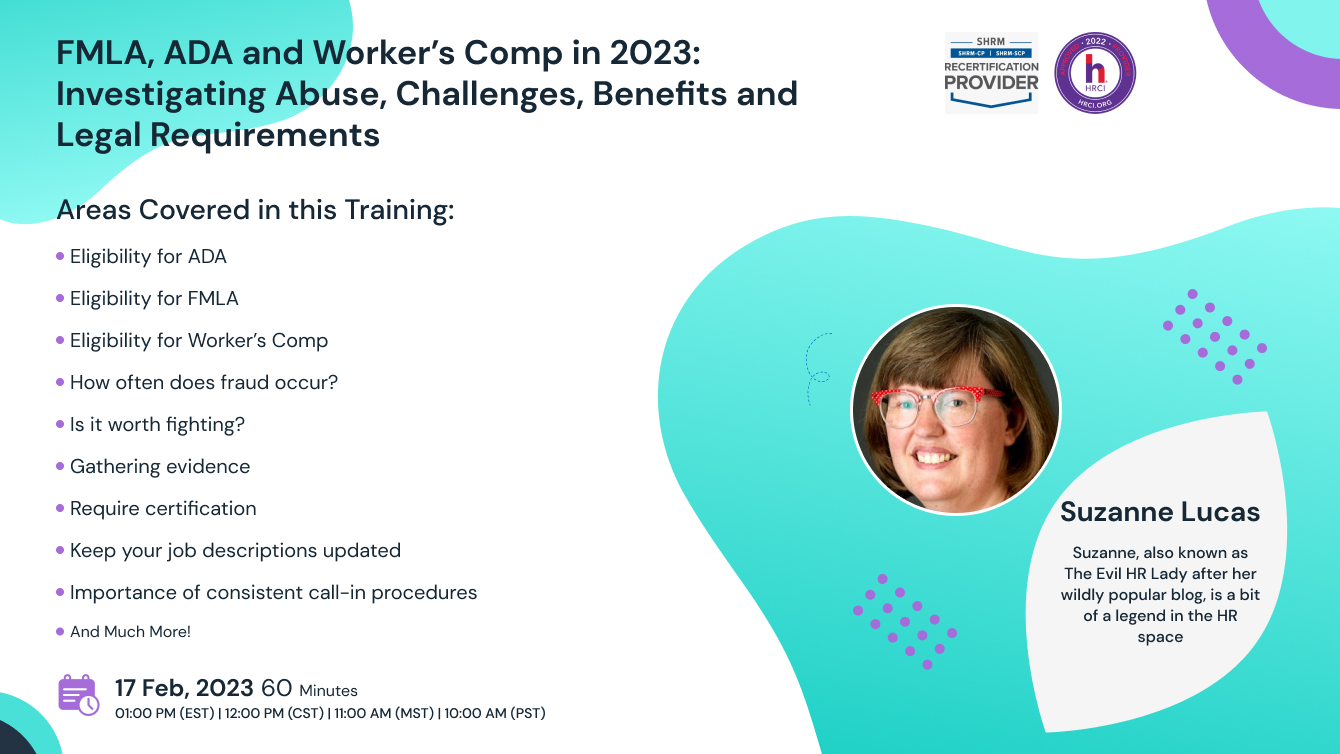Overview:
If employees meet the criteria, they are entitled to leave or accommodations under the Americans with Disabilities Act (ADA), the Family Medical Leave Act (FMLA), and Worker’s Compensation. These are great things that you must provide your employees. The legal requirements of both the Family Medical Leave Act (FMLA) and the American Disabilities Act Amendment Act (ADAAA) are similar, yet at other times one law contradicts another. You find that you can’t comply with both laws at the same time, so which one takes precedence over the other? Where does Workers' Compensation (WC) come in?
But what if they are lying? What if you think that they aren’t injured or are using intermittent FMLA to go skiing? You need to investigate, but you need to do it right to make sure you aren’t violating their rights. This is a brief overview of how to proceed and is not legal advice.
But you don’t have to despair! In this webinar, we’ll help you begin to unravel this tangled web of often overlapping employee leave laws. We’ll help you alleviate concerns about administrative headaches, employee leaves abuse, and negative impact to your bottom line on one end and risk of non-compliance with FMLA, ADA, and workers comp laws on the other end.
Areas Covered in this Training:
-Eligibility for ADA
-Eligibility for FMLA
-Eligibility for Worker’s Comp
-How often does fraud occur?
-Is it worth fighting?
-Gathering evidence
-Require certification
-Keep your job descriptions updated
-Importance of consistent call-in procedures
-Why you should consider an outside investigator
-How to avoid retaliation
-Take the doctor’s word (or pay for a second opinion)
-The difference between someone with a “serious health condition” under the FMLA and a “qualified individual with a disability” under the ADA/ADAAA.
-Situations where the FMLA and ADA/ADAAA may overlap
Why Attend this Training:
These three seemingly different bodies of law often intersect in a way that leaves many employers scratching their heads. What are the eligibility/coverage criteria under the FMLA and the ADA/ADAAA and workers comp? When might an extended leave be a reasonable accommodation? When might it be an undue hardship? Undue hardship can mean different things to different employers.
In this training, you’ll receive an overview of how to best avoid fraud and investigate fraud when you feel an employee is cheating the system. Conducting a proper investigation allows you to act with confidence.
Suggested Attendees-
-Business Owners
-Human Resources professionals
-Managers & Supervisors
-Project Managers
-Team Leaders
-Compliance professionals
-Operations professionals
-Risk Managers
-Benefit Specialists
-Controllers/ CFOs / Financial Managers
-HIPAA Officer
-Privacy Officer
-Health Information Manager
-Healthcare Counsel/lawyer

Suzanne Lucas
Suzanne Lucas spent 10 years in corporate HR where she hired, fired, managed the numbers, and double- checked with the lawyers. She left the corporate world to advise people and companies on how to have the best Human Resources departments possible.
Suzanne integrates best practices with innovative ideas and humour, including using improve comedy as a tool for leadership development.
Suzanne’s writings have been published at CBS News, Inc. Magazine, Reader’s Digest, and many other sites. She’s been named a top influencer in HR. You can read her archives at EvilHRLady.org or check out her Tedx Talk: Forget Talent and Get to Work.
Standeagle Webinar Certification - Standeagle rewards you with Standeagle Achievement Certification for unlocking and attending this webinar. It is to acknowledge your participation in this training session and to add more to your professional score.
Standeagle Courses and Webinars or any Education published "Articles & Materials" strictly follows the standards and guidelines of the Professional Credit / CEU Providers and Well Researched before publishment.
Standeagle doesn't support any Fake - News, Articles, or Compliance updates; Our Industry Experts are highly verified and recognized, and their Pre-publishment is verified via our experts and fact-checkers.

ACCREDITATIONS


